|
|
|
Sort Order |
|
|
|
Items / Page
|
|
|
|
|
|
|
| Srl | Item |
| 1 |
ID:
117988
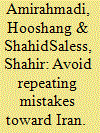

|
|
|
|
|
| Publication |
2013.
|
| Summary/Abstract |
The United States and Iran have been locked in a historically rare relationship: Washington and Tehran have not been able to talk to each other in a meaningful and consistent way. This pattern was not seen even during the Cold War between the United States and its communist adversaries. If the factors which have perpetuated this state of non-communication (or failing engagement) continue to go ignored, it is unreasonable to expect a negotiated solution in the coming months or years. This essay seeks to answer three questions: First, why have Iran and the United States been unable to engage in sustained dialogue aimed at détente and minimal cooperation? Second, why will current U.S. policies toward Iran's nuclear program likely fail, leading to a war that would make Iran weaponize? Third, what strategies and policies should be implemented to end the standoff over Iran's nuclear program, and facilitate détente between the two countries?
|
|
|
|
|
|
|
|
|
|
|
|
|
|
|
|
| 2 |
ID:
179818
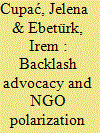

|
|
|
|
|
| Summary/Abstract |
The article observes that women's rights politics in the United Nations are caught in full-scale polarization between feminist and conservative non-governmental organizations (NGOs), particularly visible in their fights over institutional spaces and language. It then sets out to elucidate the process by which this polarization came about. It first ties it to specific reasons for which conservative NGOs entered the UN; namely, their intent to halt and reverse the progress of women's rights. Next, the article observes that this intent has given birth to a specific style of conservative NGOs' advocacy: backlash advocacy. This advocacy differs from regular advocacy in that it does not target only UN decision-makers, but also a rival NGO group and its normative record. Polarization results from feminist NGOs' defensively reciprocating this attack. The article contributes to the literature on international organization (IO)–NGO relations by specifying why conservative NGOs, considered unlikely IO utilizers, end up actively using the UN and by showing that this diversification in NGOs' utilization of the UN can have detrimental rather than positive institutional effects. The article also invites feminist NGOs to be more aware of the political dynamic that now entraps them, and to tailor their future strategies accordingly.
|
|
|
|
|
|
|
|
|
|
|
|
|
|
|
|
| 3 |
ID:
078981
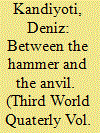

|
|
|
|
|
| Publication |
2007.
|
| Summary/Abstract |
This paper argues that gender issues are becoming politicised in novel and counterproductive ways in contexts where armed interventions usher in new blueprints for governance and 'democratisation'. Using illustrations from constitutional and electoral processes in Afghanistan and Iraq, it analyses how the nature of emerging political settlements in environments of high risk and insecurity may jeopardise stated international commitments to a women's rights agenda. The disjuncture between stated aims and observed outcomes becomes particularly acute in contexts where security and the rule of law are severely compromised, where Islam becomes a stake in power struggles among contending factions and where ethnic/sectarian constituencies are locked in struggles of representation in defence of their collective rights.
|
|
|
|
|
|
|
|
|
|
|
|
|
|
|
|
| 4 |
ID:
099905
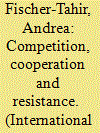

|
|
|
|
|
| Publication |
2010.
|
| Summary/Abstract |
After the fall of Saddam Hussein's regime in April 2003 many women supported the process of transition and became active in political parties and coalitions. A wide range of groups were also formed which pursued women's rights agendas and, in many cases, included a call for peace and reconciliation and charity activities for women and children. However, female political action and the field of women's rights remain divided by the same multiple boundaries of belonging which affect Iraqi society itself; women operate in specific ethnic and denominational, local and regional settings, and they support nationalist, secularist, left-wing or Islamist agendas. Women's rights-whatever the direction-can be of major or minor concern.
This article outlines female political action and draws attention to the key issues which are discussed, in particular, by secular feminists in Iraq. In so doing, the article highlights how women in Iraq have not only lost, as a wide range of observers argue, but have also benefited from the restructure of the political landscape. Female political activists are still faced with old and new social, cultural, legal and political obstacles. The article argues that when women support narratives that leave men's superiority untouched, they are not simply victims of men or 'false consciousness'; women either compete and cooperate, or they reject ideological narratives and power relations, while pursuing agendas of individual interest. Yet, despite competition among women and women's groups, and women's loyalty to agendas controlled by men, radical overtones that resist male domination can be heard- and should be supported.
|
|
|
|
|
|
|
|
|
|
|
|
|
|
|
|
| 5 |
ID:
121474
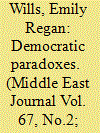

|
|
|
|
|
| Publication |
2013.
|
| Summary/Abstract |
The 1999 decree by Kuwait's emir granting women electoral rights, and its subsequent parliamentary rejection, is more than just an instance of women's oppression in action. It also demonstrates a potential paradox between two axes of democratization: liberalization, the existence of a sphere of meaningful public contestation, and participation, that the right to participate in that sphere is extended to all. In Kuwait, 1999 represents an instance where those two axes were in direct competition. This article explores the 1999 enfranchisement as a way of understanding this democratic paradox and then follows these issues through the successful 2005 enfranchisement and the election of female Assembly members in 2007 and in the 2012, post-Arab Spring elections.
|
|
|
|
|
|
|
|
|
|
|
|
|
|
|
|
| 6 |
ID:
076320
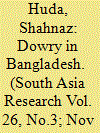

|
|
|
|
|
| Publication |
2006.
|
| Summary/Abstract |
Marriage negotiations for Bangladeshi Muslims involve various financial transactions including primarily the religiously sanctioned dower (mahr). Added to mahr, the practice of dowry or joutuk, demands made by the husband's side to the bride's side, have in the last few decades become a widespread practice supported neither by state law nor personal laws, but apparently designed to strengthen traditional patriarchal assumptions. Based on detailed fieldwork, this article discusses the historical assimilation of dowry practices in Bangladesh, including debates regarding its social ramifications on women's rights in Bangladesh, linked now to growing evidence of dowry-related violence. The existing dowry practices, despite legal intervention, continue to compromise women's rights in Bangladesh.
|
|
|
|
|
|
|
|
|
|
|
|
|
|
|
|
| 7 |
ID:
128529
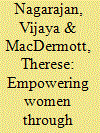

|
|
|
|
|
| Publication |
2013.
|
| Summary/Abstract |
Although the pluralist system of land tenure in Vanuatu does not directly discriminate against women, the operation of the system and contemporary interpretations of custom is increasingly marginalising women from the decision making processes regarding land management and control. Commitment to the principles of gender equality through constitutional guarantees and the ratification of relevant international treaty obligations, while providing a relevant legal framework for equality, have only had limited success in addressing discriminatory practices. This article analyses alternative ways to overcome the barriers faced by women that are currently under consideration in many Pacific island Countries, including recording and registration, as well as legal vehicles such as incorporating customary land groups, trusts and community companies. This article concludes that while both existing and proposed mechanisms have the potential to secure for women a greater role in decision making processes regarding land management and control, that potential will not be realised in the absence of knowledge, empowerment and the acceptance of the legitimacy of such rights
|
|
|
|
|
|
|
|
|
|
|
|
|
|
|
|
| 8 |
ID:
116541
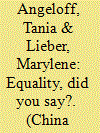

|
|
|
|
|
| Publication |
2012.
|
| Summary/Abstract |
After 30 years of economic reforms, what is the comparative situation of men and women in the People's Republic of China? How can we analyse the policies for promoting gender equality? Have inequalities that existed in Mao's China disappeared now? Or have factors such as the liberalisation of the labour market and the single child policy merely shifted the boundaries of such inequalities and even created others? This article looks at the ways in which the equality issue is dealt with, both by the government and by the All China Women's Federation and feminist organisations. It seeks to show which inequalities are prioritised and what has been the state's place in contemporary Chinese feminism.
|
|
|
|
|
|
|
|
|
|
|
|
|
|
|
|
| 9 |
ID:
121460
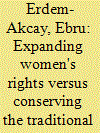

|
|
|
|
|
| Publication |
2013.
|
| Summary/Abstract |
Parliamentary debates on the 2001 Turkish civil code amendments have been analysed within the framework of the Islamism-secularism dichotomy. This article re-examines the debates and shows that the discussions on the amendments go beyond this dichotomy. Conservative opposition to the amendments reflected a desire to prevent state and court intervention in the customary practices and to preserve traditional family relationships rather than an Islamist attempt to expand the realm of religion. Women's rights were not simply another instrument for the Islamist-secularist competition as previously argued; the debates were ultimately about whether those rights should be defined according to traditional customs or the norms accepted by international agreements.
|
|
|
|
|
|
|
|
|
|
|
|
|
|
|
|
| 10 |
ID:
143139
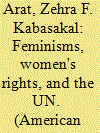

|
|
|
|
|
| Summary/Abstract |
Although all theories that oppose the subordination of women can be called feminist, beyond this common denominator, feminisms vary in terms of what they see as the cause of women's subordination, alternatives to patriarchal society, and proposed strategies to achieve the desired change. This article offers a critical examination of the interaction of feminist theories and the international human rights discourses as articulated at the UN forums and documents. It contends that although a range of feminisms that elucidate the diversity of women's experiences and complexities of oppression have been incorporated into some UN documents, the overall women's rights approach of the UN is still informed by the demands and expectations of liberal feminism. This is particularly evident in the aggregate indicators that are employed to assess the “empowerment of women.” In addition to explaining why liberal feminism trumps other feminisms, the article addresses the problems with following policies that are informed by liberal feminism. Noting that the integrative approach of liberal feminism may establish gender equality without empowering the majority of women, it criticizes using aggregate indicators of empowerment for conflating sources of power with empowerment and making false assumptions.
|
|
|
|
|
|
|
|
|
|
|
|
|
|
|
|
| 11 |
ID:
120983
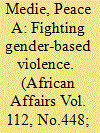

|
|
|
|
|
| Publication |
2013.
|
| Summary/Abstract |
Many African states have adopted laws that criminalize rape and other forms of gender-based violence (GBV), but the enforcement of such laws is often weak. Many rape cases are never brought to court and victims are frequently encouraged to accept reconciliation instead of prosecution of offenders. Drawing on research from post-conflict Liberia, this article investigates the ability of women's movements to influence the state's implementation of rape law, and seeks to theorize the relationship between women's activism and the enforcement of rape law. It documents the range of strategies adopted by the Liberian women's movement, and argues that these tactics have contributed to an increased referral of rape cases to court. This was made possible by two conditions: a relatively open political environment and political and material support from international organizations, which in turn enabled women's NGOs to gain access to and make an impression on the implementation process. This demonstrates the capacity of civil society organizations in Africa's more open and internationally connected states to influence policy at the implementation stage-even in particularly challenging areas such as women's rights.
|
|
|
|
|
|
|
|
|
|
|
|
|
|
|
|
| 12 |
ID:
109911
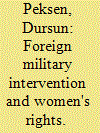

|
|
|
|
|
| Publication |
2011.
|
| Summary/Abstract |
A large body of scholarly work has been devoted to the possible consequences of foreign military intervention for the target state. This literature, however, tends to be state-centric and mostly neglects the insight from gender-specific theoretical and empirical perspectives. The purpose of this article is to examine the extent to which military intervention affects women's rights. It is argued that unilateral interventions are prone to diminishing women's status by encouraging the persistence or creation of repressive regimes and contributing to political disorder in the target state. If the use of armed forces ever helps or causes no damage to women's well-being, it will likely be during interventions led by intergovernmental organizations (IGOs). This is because IGO interventions are unlikely to protect or support an authoritarian, patriarchal political system. Furthermore, such multilateral missions will increase international awareness of women's status along with other human rights issues in the target society, thereby creating more pressure on the government to enforce women's rights. To empirically substantiate these arguments, three different indicators that tap socio-economic and political aspects of women's status are used, including the indices of women's economic, political, and social rights from the Cingranelli-Richards database. The results indicate that while women's political and economic status suffer most during unilateral US interventions, IGO interventions are likely to have a positive influence on women's political rights. Non-US unilateral interventions, on the other hand, are unlikely to cause any major change in women's status. Finally, military interventions in general have no major statistically significant impact on women's social rights.
|
|
|
|
|
|
|
|
|
|
|
|
|
|
|
|
| 13 |
ID:
188719
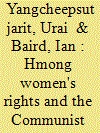

|
|
|
|
|
| Summary/Abstract |
Between 1967 and 1969, thousands of Hmong in northern Thailand became aligned with the Communist Party of Thailand (CPT) and resided in mountainous strongholds near the border with Laos in Chiang Rai, Phayao, Nan, Phetchabun, and Phitsanulok provinces, and in Tak province near the border with Burma. They stayed in these strongholds until the early 1980s, when the CPT fell apart. During the CPT period, some important transformations in Hmong gender relations occurred, especially relative to the traditional strongly male-dominated society. We describe the most important changes, as reported by Hmong women. The legacy of the CPT period remains today. However, there has been some reversion to pre-CPT patriarchal practices. Some Hmong women feel nostalgic about the rights they enjoyed during the CPT period, although the leadership of the CPT was male dominated, and despite the fact that some progress has been made, for example, in convincing clan leaders to allow divorced women to return to their birth clans. This study applies a feminist geography and social memory theoretical framework to examine Hmong women's life stories about their time with the CPT.
|
|
|
|
|
|
|
|
|
|
|
|
|
|
|
|
| 14 |
ID:
111744
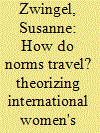

|
|
|
|
|
| Publication |
2012.
|
| Summary/Abstract |
If women's rights norms have become internationally acknowledged, is it reasonable to assume that the status of women worldwide has improved because of international norms? It is argued here that the assumption of a global-to-local flow of norms inherent in most of the global norm diffusion literature is simplistic. To provide a more adequate theoretical framework, the paper juxtaposes the debate on the impact of international regimes and the power of global norms with an interdisciplinary mix of transnational approaches that identify multidirectional processes of appropriation and contestation of global norms. Departing from the Convention on the Elimination of All Forms of Discrimination Against Women (CEDAW) as the most authoritative and steady piece of the international women's rights discourse, the transnational perspective developed here proposes three main constellations of traveling global norms: global discourse translation, impact translation, and distorted translation.
|
|
|
|
|
|
|
|
|
|
|
|
|
|
|
|
| 15 |
ID:
130830
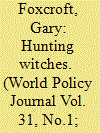

|
|
|
| 16 |
ID:
072136
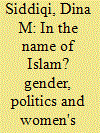

|
|
|
|
|
| Publication |
2006.
|
| Summary/Abstract |
Recent fatwa-related violence against women in Bangladesh cannot be understood solely as a backlash to modernity and women's increased visibility. Shifting power dynamics locally and a rightward shift in national politics explain the rising significance of fatwas in policing women's activities.
|
|
|
|
|
|
|
|
|
|
|
|
|
|
|
|
| 17 |
ID:
048104
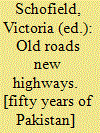

|
|
|
|
|
| Publication |
Karachi, Oxford University Press, 1997.
|
| Description |
xx, 341p.: ill.hbk
|
| Standard Number |
0195778456
|
|
|
|
|
|
|
|
|
|
|
|
Copies: C:1/I:0,R:0,Q:0
Circulation
| Accession# | Call# | Current Location | Status | Policy | Location |
| 042519 | 954.91/SCH 042519 | Main | On Shelf | General | |
|
|
|
|
| 18 |
ID:
050549
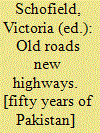

|
|
|
|
|
| Publication |
Karachi, Oxford University Press, 1997.
|
| Description |
xx, 341p.: ill.hbk
|
| Standard Number |
0195778456
|
|
|
|
|
|
|
|
|
|
|
|
Copies: C:1/I:0,R:0,Q:0
Circulation
| Accession# | Call# | Current Location | Status | Policy | Location |
| 043919 | 954.91/SCH 043919 | Main | On Shelf | General | |
|
|
|
|
| 19 |
ID:
120345
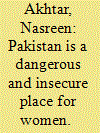

|
|
|
| 20 |
ID:
051538
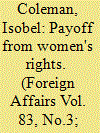

|
|
|
|
|
| Publication |
May-Jun 2004.
|
| Summary/Abstract |
Backing women's rights in developing countries isn't just good ethics; it's also sound economics. Growth and living standards get a dramatic boost when women are given just a bit more education, political clout, and economic opportunity. So the United States should aggressively promote women's rights abroad. And by couching its case in economic terms, it might even overcome the resistance of conservative Muslim countries that have long balked at gender equality.
|
|
|
|
|
|
|
|
|
|
|
|
|
|
|
|
|
|
|
|
|